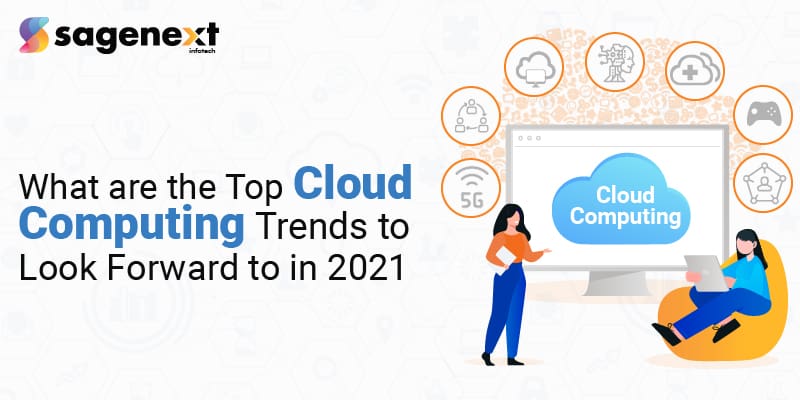
What are the Top Cloud Computing Trends to Look Forward to in 2021
Cloud computing has been the major technology enabler for businesses across the globe in the testing times of COVID-19. It has emerged as a true savior for organizations of all sizes. Most of the businesses and their employees had a great challenge in terms of business continuity amidst the pandemic. The cloud has helped them champion that challenge by offering seamless remote working capabilities.
The cloud has helped organizations manage their businesses in the middle of this unprecedented situation. It has done so in the following ways:
- Enabled a remote workforce for employees to stay connected and ensure business continuity.
- Provided effortless access to online information backup strategies that are rapidly scalable.
- Enabled easy and efficient collaboration between team members with the help of its productive collaboration applications.
“The cloud-enabled video conferencing application, Zoom, reported a massive YoY growth of 169 percent in its first-quarter report for the financial year 2021.”

The cloud has been the backbone of modern, application-based, data-driven technology ecosystem ever since the concept of remote delivery of services via the internet became practical. It was the major reason behind the growing popularity of the cloud. Further, The paradigm shift enforced by the COVID-19 has accelerated the adoption of cloud computing. The trend is expected to continue even at a faster pace as more and more businesses witness the innate benefits of the cloud.
Today, the delivery of information and services directly from the cloud to a user’s internet-connected devices has become more integral than ever. It is the reason most modern businesses are coming to grips with various cloud computing models. The concepts of remote medicine, instant delivery of services, working from home, etcetera are here to stay and hence, the cloud is expected to witness accelerated adoption rates throughout 2021.
The following are some of the top cloud computing trends we can look forward to in 2021 and beyond:

1) 5G Serving as Key Enabler of the Cloud
The fifth-generation (5G) telecommunication network is being deployed in locations across the world in 2020 and is expected to have a significant presence by 2021. Of all its upgrades over its predecessor, the 4G, the faster data speed is one that excites us all. Its faster speed is the reason why it is being considered an essential promoter of cloud computing.
The faster speeds of 5G will enable faster transmission of data and resources to and from the cloud, making the cloud even more efficient than it already is. The advanced network of 5G will help deliver the actual value the cloud is capable of delivering. It will enable the users to perform all the complex analysis and ultra-fast computing in real-time, even without plugging in cables.
Hence, the 5G technology is expected to assist the cloud service providers in reaching a wider enterprise audience, with greater reliability and ease. Further, as more and more businesses are shifting towards remote working strategies, aiming for business continuity and efficiency, the cloud integration is set to improve due to the smoother communications that the 5G promises because of its low to zero latency.
2) Multi-cloud Strategies Leading to Collaborations Between Service Providers
The leading public cloud service providers like Microsoft, Google, Amazon, etcetera incorporates a walled garden technique to offer their services. They have a business plan that promotes their platforms as one-stop stores that cover all the data, cloud, and computing requirements of an organization.
However, modern businesses have started to shift towards multi-cloud platforms that require infrastructure to be employed across various models. This necessitates the leading cloud service providers to develop bridges between the platforms they offer.
The collaboration between the providers will not only enable users to take advantage of the rapidly increasing multi-cloud trend but also allow them to share information and access with business partners working across different applications and information standards.
We are also expected to witness greater innovations by the present-day startups in the same space as they try to create services that support easy operations between diverse public cloud platforms.
3) Increasing use of Virtual Cloud Desktops
A Virtual Cloud Desktop, also called a cloud-hosted virtual desktop, is a workstation where the cloud services are delivered. To access a virtual desktop, a user simply requires a device having a connection to the internet. It is extremely beneficial for businesses as they no longer require to procure and maintain high-end devices that support their applications. Instead of disposing of their redundant machines, they can now use them as virtual cloud desktops to ensure business continuity. Businesses can also opt for a by-the-hour subscription model that further enhances their cost-efficiency.
The technology is expected to boost business efficiency by making sure all employees use the latest, synchronized tools. One of the biggest advantages of using a virtual cloud desktop is to ensure the security of all devices in practice. Businesses need to only secure the central server rather than worrying about the security practices of all the individual participating devices.
The cloud-hosted virtual desktops are also known as Desktop-as-a-Service (DaaS). Microsoft’s Windows Virtual Desktop, Amazon’s Workspaces platform, and Google’s Chromebook devices, etcetera, are some of the popular DaaS models of computing.
Virtual desktops are known for the greater flexibility, cost-efficiency, and security they offer compared to the traditional, in-house systems. This, along with the increasing need for remote work capabilities ensures us of their increasing popularity in 2021 and beyond.
4) Artificial Intelligence Improving the Speed and Efficiency of Cloud Computing
In terms of technology adapting to diverse user requirements in the future, AI is considered a major cloud facilitator as it can help bring services that cater to user’s needs. It unlocks access to various machine learning applications like language processing, image recognition, and recommendation systems, etcetera. Cloud will enable the wide deployment of these revolutionary tools in various fields, making sure enterprises achieve greater productivity and efficiency.
Pandemic response planning, self-driving vehicles, and smart city projects are some of the areas where the cloud would be delivering smarter, breakthrough algorithms for a better future. AI algorithms can help manage and monitor the cooling systems, power usage, and networks of hardware, etcetera in order to achieve cloud data center efficiency and speed.
5) Growing Popularity of Hybrid Cloud Solutions
It has been a great challenge for an organization to select one amongst the private, public, or hybrid cloud. Each of the clouds has its own pros and cons when it comes to performance, security, flexibility, and compliance. With time, businesses are recognizing the importance of hybrid or multi-cloud strategies where they have the freedom to handpick specific elements of different service providers’ functionalities to create a cloud environment that best suits their requirements.
The cloud service providers have started to reassess their cloud offerings and are aiming for greater flexibility to meet diverse user requirements. Cloud service providers like IBM and Microsoft have already started to be pliant with allowing clients to place their cloud technologies and tools across their current, in-house networks.
Other service providers are expected to wake up to the calls for diverse cloud approaches and platforms that help users achieve the performance, flexibility, and efficiency they are aiming for. The need for combining various user requirements is expected to be the driving force behind the evolution of cloud services in 2021.
6) Cloud Gaming Becoming a Trend Similar to Music and Movies
Music and video content streaming via the cloud has become a popular trend now. Cloud gaming promises to be no different. It is believed to revolutionize the way users play games by providing instant access to immense game libraries that can be subscribed to on monthly basis, similar to the existing content streaming platforms.
Cloud computing is not only expected to disrupt the existing gaming model but also put an end to the requirement to spend hundreds of dollars on hardware devices like Playstation and Xbox consoles to have access to cutting edge gaming features.
7) Hybrid Cloud Enabling Edge Computing
Edge computing is rapidly impressing the world. It is a distributed computing model that brings data storage and computation capabilities closer to the required location to save bandwidth and enhance response times.
Edge computing enables service providers to proffer more reliable and faster services to their users. It is the principal part of the hybrid cloud strategy that enables businesses to attain consistent operations experience. It is the latest IT footprint that is a sum of all footprints like virtual environments, bare-metal, public cloud, and private cloud. Edge computing picks elements from all these four footprints to offer an infrastructure that caters to diverse user requirements that traditional IT infrastructures fail to address.
Given all the benefits it has over other cloud models, the edge computing powered by the hybrid cloud is expected to attain huge popularity in 2021.
The cloud, ever since its inception, has led to many technological revolutions through various cloud-based applications and solutions. Even in the times of COVID-19, it has ensured business operations and productivity. It is amongst those few technologies that have and will continue to transform the world in the foreseeable future.







